Peter the Great
Written by Rick Archer
February 2012
|
Most people say that
Peter the Great was a magnificent visionary. A typical
intro on the career of Peter reads like this:
One of Russia’s greatest statesmen, Peter the Great –
the Tsar and first Emperor of Russia - was a man of
unwavering willpower, extraordinary energy and supreme
vision. Having inherited a vast but backward state, he
propelled Russia to the rank of a major European power,
while his extraordinary personality and wide scale
reforms have been an inspiration to generations of
historians, writers and ordinary Russians.
I take a different
view. Although I agree that Peter accomplished great
things, he was such a despicable human being that I shudder
when I read the phrase "Peter the Great".
Of all the men in history I have studied, few have
disgusted me more than Peter of Russia. This man was a
thug and a despot.
Peter
was a vicious brute who was used to getting his way.
He had so much
power that he soon learned he could do anything he damn well
pleased. He ran ramshod over the Russian people with
complete impunity.
A physically powerful giant at 6' 8", Peter had
intellectual gifts to match. Unfortunately, he also
possessed an extremely aggressive nature. Peter's
behavior would make most Mafia Dons seem like Pollyannas in
comparison. Peter wasn't interested in mannerly
persuasion. He would threaten, intimidate, and bully
till he got what he wanted.
No one could resist
him. When someone didn't cooperate, Peter would use
force to make them an offer they couldn't refuse.
His penchant for
cruelty bordered on the barbaric.
Anyone close to
Peter was terrified of the him. Many of the old-guard
Russian nobility hated Peter with a passion because of his
constant reforms at their expense.
|
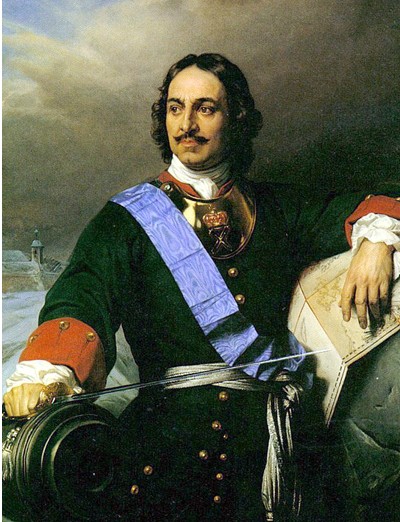 |
The boyars would do
anything to get rid of this guy.
Because Peter was
hated by so many, plots were always being developed against
him.
Unfortunately
for them, Peter had an amazing streak of luck. Someone
would always warn Peter at the last minute and allow him to
escape assassination by narrow margins. Once to
safety, Peter would then cast a wide net and gather up
anyone even remotely associated with the plot and throw them
into the dungeon.
Although many of these people
caught in the dragnet were innocent, the torture was so
brutal and sadistic they would eventually confess to
anything just to get it over with. At this point they
were beheaded. Peter himself often took part in the
beheadings himself. Their heads were impaled on spikes
and left up there for public display for months.
Eudoxia
It is said that this curious picture of
Peter the Great beating his wife hangs on
the wall of Prime Minister Vladimir Putin.
If that is the case, then it would be
interesting to know the reason.
Eudoxia Lopukhin and Peter were both 17 when
Peter's mother forced him to marry. His
mother hoped to wean him from the wicked
ways of the Moscow brothels by wedding him
to a lady who was as pious as she was
beautiful.
Although she would bear him a son, the
marriage was a total failure. Eudoxia had
grown up with her nose in religious books.
Since her mental horizons did not extend
much further than her religious training,
the brilliant Peter was bored beyond reason
by her presence. Peter had the poor
woman exiled to a lonely existence at a
monastery as swiftly as he possibly could.
|
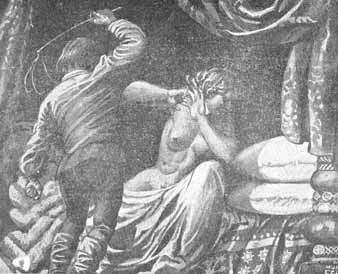 |
|
| |
|
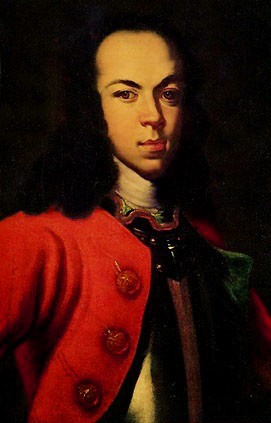 |
Alexei
The story of Alexei,
Peter's son from his marriage to Eudoxia, reads like a Greek
Tragedy. Alexei, Peter's heir, was in direct line to become
the next Tsar. Alexei's story brings up an interesting question.
You are a parent. You
have spent your entire life creating a business or an institution
that you are rightfully proud of. Then you discover your only
child intends to tear down your life work. Everything you have
ever achieved is in jeopardy because he or she doesn't like you...
and they have the power to do it.
What do you do? Do
you kill the kid?
Nothing better demonstrates
Peter's inherent cruelty than his treatment of
his first son Alexei.
By all accounts, Alexei
was a capable young man. Unfortunately, due to his father's
abuse of Alexei's mother Eudoxia and his father's dictatorial
relationship with the boy, the young man grew up hating his powerful
father.
Due to their poor
relationship, like many sons, Alexei rebelled against his father.
He hated the man's constant criticism and bullying. Alexei
hated the wife Peter had chosen for him. Alexei resisted the
military career his father forced upon him. Alexei cursed the
ground his father walked on. In private conversations,
sometimes he was so mad at his father that he said he wished the man
were dead.
|
That said, Alexei never took a single action to hurt his powerful
father. Alexei just wanted to be left alone to live in peace.
His father would have none of it. Alexei was his successor and
Peter was determined to make his son toe the line.
Unfortunately for
Alexei, he was in the wrong place at the wrong time. Even
though he did nothing wrong, Alexei would die simply because he was
flesh and blood to a despot.
The hatred of the Moscow
nobility towards Peter constantly led them to conceive of ways to
kill the dictator. If Peter were indeed killed, Alexei was
next in line to take his place.
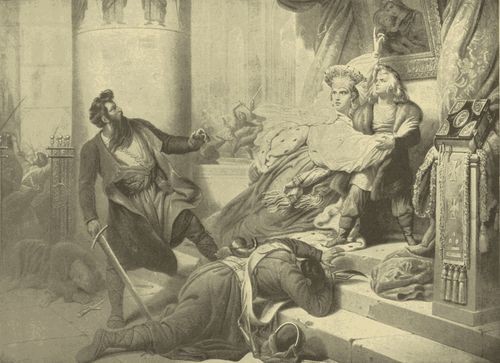 |
Tsar Peter was quite
aware just how much he was disliked. He also knew how easy it
was to kill a man who wasn't looking. When he was younger,
Peter had barely escaped two attempts on his life.
This picture shows Peter
at 16 narrowly escaping an assassin sent by his half-sister Sofia.
After the near-miss, Peter made it a point to look over his shoulder wherever he went
for the rest of his life. You might even say he was paranoid.
There is no question that Peter had a right to be worried.
Thanks to his years of excessive brutality, there were definitely
plots on his life. Unfortunately, Peter had gained so many
enemies that he had no idea who might send the next assassin.
For his protection, Peter recruited a vast network of spies.
Occasionally his son's name was brought to his attention.
Despite the fact that
Alexei's name came up from time to time in secret conversations, no
historical evidence has ever surfaced that Alexei was directly involved
in any plots. The young man was probably innocent of any
involvement in conspiracies.
|
It was simply Alexei's
misfortune that every plot and every cabal whispered Alexei's name
as Peter's replacement. Alexei's name became the catchword for
regime change. Thus his ultra paranoid father began to hear
vague reports that Alexei's name had surfaced in conversations with
men who were under suspicion for plots against the throne.
Peter took note of the
young man's insolence and rebellion and concluded Alexei's
disobedience somehow confirmed the rumors must be true.
Peter confronted the
young man directly. This famous picture shows a meeting where
Peter accused Alexei of conspiring against him. Alexei denied
it, but Peter didn't believe him.
Alexei wasn't stupid.
Based on threats made by his father, Alexei could see his father
didn't trust a word he said about his innocence. Alexei began
to greatly fear for his life.
With the help of a
well-placed Muscovite nobleman, Alexei fled the country, taking his
mistress Afrosina with him for companionship. Alexei
eventually made it to Austria where he pleaded to his brother-in-law
Emperor Charles VI for sanctuary.
The Emperor sincerely
sympathized with Alexei. He too suspected Peter harbored
murderous designs against his son. In a confidential letter to
George I of Great Britain, Charles VI told the king that he agreed
Alexei's life was in danger.
|
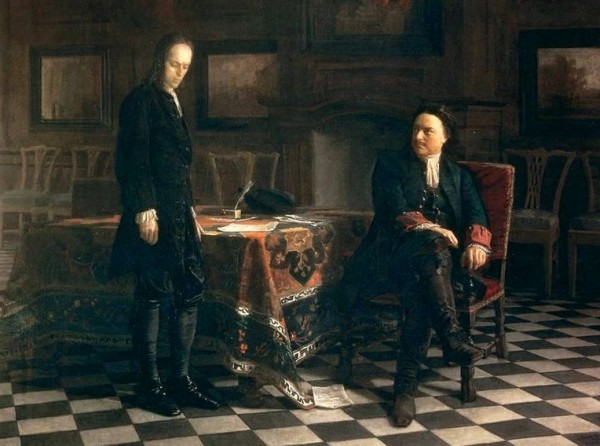 |
Meanwhile Peter felt
insulted. The flight of the tsarevich, Russia's crown prince,
to a foreign potentate was a reproach and a scandal. No one
had the right to embarrass him like that. Peter determined
Alexei had to be recovered and brought back to Russia at all costs.
Peter sent an envoy to
Austria promising total amnesty for Alexei. Mind you, Alexei's
only "crime" was running away from his abusive father.
Alexei would only consent to return on
his father solemnly swearing that if he came back he should not be
punished in the least. Alexei asked to be
allowed to live quietly on his estates and marry Afrosina.
Alexei said in return he would swear away his birthright and allow
Peter to pick a successor of his choosing. Peter agreed to
these terms.
Thus Alexei returned to
Russia. He was immediately imprisoned. Peter still
suspected a Grand Plot in which his son was surely involved.
He ordered his interrogators to spare nothing until they got to the
bottom of the threats against him.
Not only did they
torture Alexei, they tortured his mistress as well. Under
pressure, Afrosina admitted that Alexei had said many times he
wished his father was dead. This didn't help things, but,
oddly enough, it was Alexei's other admission that probably sealed
his doom.
Afrosina reported she
had often heard Alexei say, "I
shall bring back the old people and choose myself new ones according
to my will; when I become sovereign I shall live in Moscow and leave
Saint Petersburg simply as any other town; I won't launch any ships;
I shall maintain troops only for defense, and won't make war on
anyone; I shall be content with the old domains. In winter I
shall live in Moscow, and in summer in Yaroslavl."
This statement caused
Peter to go ballistic. Alexei's refusal to support his
father's modernization of Russia was anathema to him. Peter
had spent his entire life turning Russia from a backward nation into
an empire. The thought that his own son was willing to unravel
all his work was way beyond anything Peter could tolerate.
This was a betrayal of the highest magnitude.
The inquisition of Alexei continued until a "confession" was
extorted from him. Breaking down, Alexei was forced to
implicate most of his friends against his will. Alexei then
publicly renounced the succession to the throne in favor of the baby
grand-duke Peter Petrovich, Tsar Peter's first son by a second wife.
We all know that
information gained by extreme torture is unreliable. Despite
Afrosina's admission and other hearsay evidence, there were no
actual facts to go upon to prove Alexei guilty of a crime.
Peter paid no heed. In the eyes of Peter, his son was a
self-convicted traitor. His continued existence was a threat
to Peter's life work. By Alexei's own words, his son's life
was now forfeit.
A horrible reign of
terror ensued. In short time, the ex-tsaritsa Eudoxia,
Alexei's mother, was dragged from her monastery and publicly tried
for alleged adultery. Subsequently, all who had in any way
befriended Alexei were racked to death on the wheel, then impaled
and left to hang there in public. All this was done to
terrorize the reactionaries into ceasing all talk of rebellion.
Peter understood that as
long as Alexei lived, all proclamations renouncing the throne were
meaningless if Peter were assassinated. Alexei's claim to the
throne would be immediately reinstated. Alexei had to go.
Based on information Alexei was coerced to say during his
"confessions", Alexei was sentenced to death. So much for
Peter's promises of amnesty.
The thing to remember is
that Peter was not "mad" in the sense of other tyrants like Nero and
Caligula. He was an intelligent, educated man completely
capable of reasoning. But he was definitely "mad" in the other
sense. Peter's temper was so extreme that he couldn't think
straight. Peter's capacity for cruelty was well known, but his
son's defiance had turned into a monster. He was so enraged
that Peter came very close to executing his son with his own hands.
Fortunately, Peter was
spared this final ignominy when Alexei died from wounds suffered
while being tortured.
The kid never had a
chance. This story should be all that is necessary to explain
why I hold Peter the Great in complete and utter contempt.
|
The Man Who
Changed the Course of Russia's Destiny
Is it possible for evil
men to do good things? This is after all the man who murdered
his own son and quelled any hint of insurrection with mass
executions. Peter was so brutal that sometimes he personally
executed his enemies with his own sword.
His cruelty
notwithstanding, Peter was also brilliant. Energetic, highly
educated and extremely inquisitive, Peter took his role as monarch
seriously. Peter had a vision of Russia's potential and
dedicated his life to reaching those goals. He personally
brought Russia kicking and screaming into modern times through sheer
brute force.
In fact, the argument
could be made that Russia was so backwards and so stuck in its
medieval ways that only a powerful tyrant like Peter could have ever
have so profoundly changed the course of Russia's destiny. Peter saw
changes that needed to be made and he gave orders that the Russian
people had to follow whether they liked it or not.
During Peter's reign
(1700-1725), he instigated profound changes. Peter launched a
series of reforms that affected, in the course of 25 years, every
area of his nation’s life - administration, industry, commerce,
technology and culture. Peter upgraded the army, he created the
navy, he changed the church, he changed the laws, he changed the
taxes and he reformed the government. Peter was the first
Russian leader to engage in direct contact with the leaders of
Europe. Thanks to his military build-up, he engaged
practically every single one of his neighbors in war and expanded
the boundaries of Russia dramatically.
No part of Russian life
was untouched. Peter even instigated social changes. He
micro-managed Russia so completely that he dictated fashion changes.
He told people to begin wearing European-style clothing. He
told the men to shave their beards or suffer a penalty.
By the time Peter was finished, he claimed for himself the title of
"Emperor" and proclaimed Russia to now be an Empire. Peter
left a mark on Russia so profound that still to this day, Russia
divides its history lessons into 'Before Peter' and 'After Peter'.
|
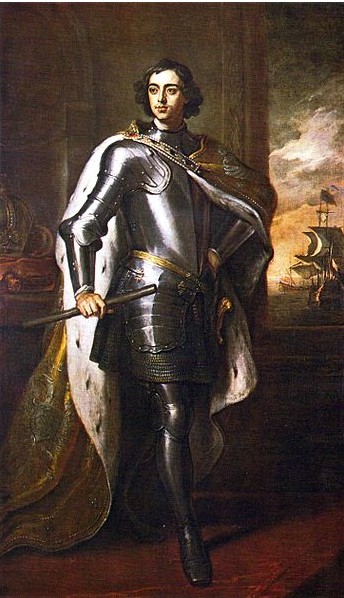 |
| |
The Golden Horde
To appreciate the
accomplishments of Peter, I think it is important to review "why"
Russia was considered to be so backward by the countries of Europe.
As I wrote in my
first article, the watershed moment in Russian History was
the 13th century invasion of the Golden Horde of the Mongols.
The geography of Russia
played a major role in the Mongol Invasions. The Ural
Mountains served as an imposing barrier to any horseback-mounted
army.
On the other hand, there
was a vast prairie known as the Grand Steppe that extended all the
way from Mongolia into the Eastern Europe regions of Romania and
Bulgaria. The Grand Steppe operated essentially as an ancient
freeway with few obstacles connecting eastern Asia to western Asia.
The Grand Steppe was the
route taken by the invasion force.
|
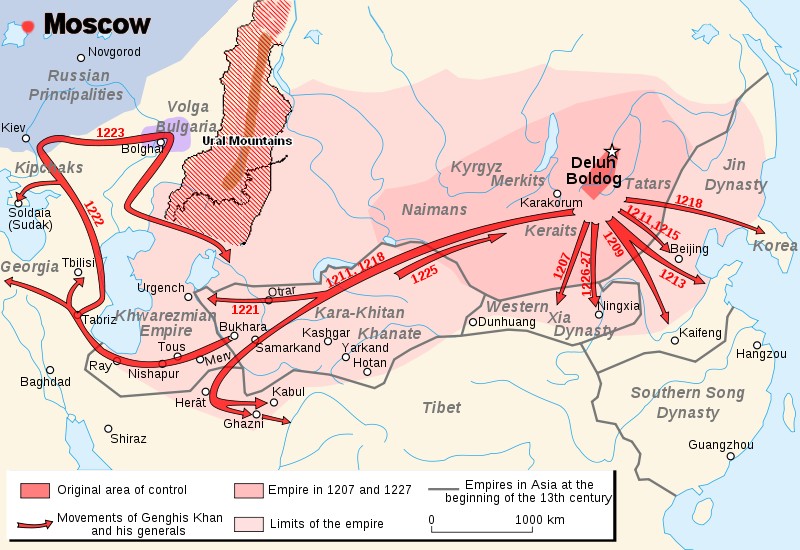 |
In 1222, the area known as Kievan Rus',
better known today as the Ukraine, faced the unexpected
onslaught of an irresistible foe coming
from the mysterious regions of the Far East.
"For our sins", writes the Rus' chronicler
of the time, "unknown nations arrived. No one knew their origin or
whence they came, or what religion they practiced,
or the name of their tribe. They
were upon us before we could scarcely muster a defense. Vast
armies descended as a plague of locusts would attack our fields.
These barbarians were so skilled at war and so ruthless that our
resistance proved futile."
Students of history
might be surprised to learn that Genghis Khan did not actually
participate in the conquests of Russian territory.
Genghis Khan's main
accomplishment was conquering and uniting the people of Eastern
Asia. However, at the time of the western invasions, Genghis
Khan was an old man.
|
Instead, the leader of
the invasions was Batu Khan, grandson of Genghis Khan.
The Mongols invaded the
west many times. They would conquer, then go home and
recharge. A few years later, they would be back to conquer
more.
Batu Khan was a
brilliant strategist. He had all sorts of clever ideas.
One trick was to use the Russian winter to his advantage... the
easiest time to cross the rivers was to wait till they iced over.
Batu Khan's army was
unstoppable. In all his battles, he was only defeated once.
His armies penetrated deep into Hungary and Poland. Europe
seemed to have no answer for these invaders.
Then Batu Khan's father
died back in the homeland. Batu Khan was honor-bound to return
home to anoint a new chief.
There are historians who
suggest Batu Khan's cessation of attacks in 1242 actually saved
Christianity.
|
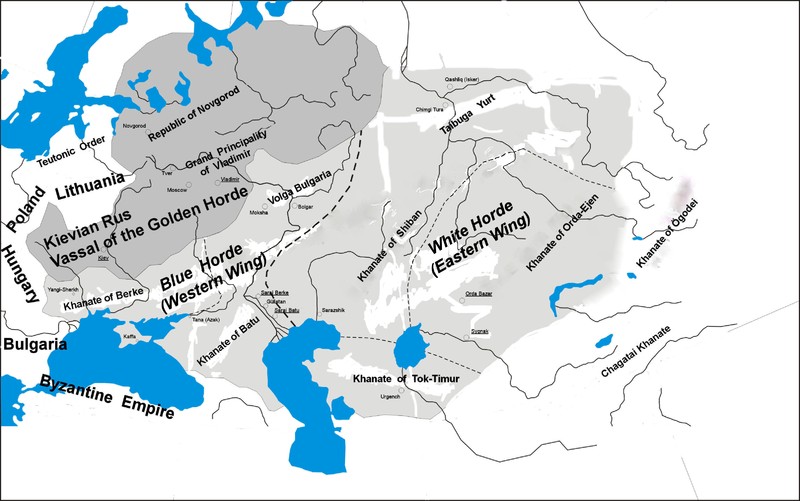 |
Thanks to his
father's death, the invasion of 1242 that threatened the heart of
Europe was over. But the misery continued. Batu Khan would
return several times in later years to continue the marauding.
However the Mongols never attacked the Republic of Novgorod,
the predecessor to the Grand Duchy of Moscow.
The Novgorod Republic managed to escape the
horrors of the Mongol invasion because the commanders did not want
to get bogged down
in the snow of the thick forests, the soupy marshlands and the
bitter cold. The harsh forests made heading south much
preferable. Novgorod was just 60 miles away when the
Mongols changed direction. Northern Russia was spared.
Nevertheless this area
remained under Mongol subjugation for 250 years! So how did
that happen? In 1259, Mongol tax-collectors and
census-takers arrived in Novgorod.
In spite of never being formally conquered, the Republic
was ordered to begin
to pay tribute to the khans of the Golden Horde.
Of course the people
refused to do so at first. However, a Russian leader acting as
a Mongol liaison named Alexander
Nevsky punished a number of town officials
by cutting off their noses for defying his
authority as Grand Prince of Vladimir.
After this show of force, Nevsky pointed out that his action was
nothing compared to what the Mongols would do. He made it
clear that the Mongols would inflict far greater damage if the
resistance continued.
In the end, the threat
of Mongol invasion inspired so much fear that the officials knuckled
under and accepted the Mongol yoke.
Over the next two
centuries, Moscow outmaneuvered its rivals in Novgorod, Vladimir,
and Tver to become the ascendant power in the region.
It can be argued that
without the Mongol destruction of Kievan Rus' (Ukraine) that Moscow
would never have risen to the forefront. In short, the Mongol
influence, while destructive in the extreme to their enemies,
dictated who would eventually become the new rulers of modern
Russia.
When Moscow under Ivan
the Great finally told the Mongols to get lost in 1480, the city and
Ivan stood supreme as the single greatest power in the land.
(Note: I wrote about the
Grand Duchy of Moscow at length in my previous chapter if
you wish to read more.)
|
Long Term Effects of Mongol Yoke
The Mongol Yoke kept
Russia looking eastward for 200 years.
Historians consider the
oppression of Rus' by the Mongols to be the major cause of what is
sometimes called "the East-West Gap". Thanks to the Mongol
subjugation, there was a 200 year delay in introducing major social,
political and economical reforms and scientific innovations in
Russia compared to Western Europe. Russia was so focused on
the Mongols that they failed to significantly interact with Europe.
The isolation from the West caused Russia's non-involvement in the
Renaissance, the Protestant Reformation, and failure to develop a
middle class.
The Mongol occupation
created not one, but two profoundly dark influences on Russian
society. The
Mongols have been blamed for the introduction of "oriental
despotism" into Russia. In this system, the majority of the
people are kept in a servile state looking to the despot for
direction. There was little encouragement intellectual
curiosity and certainly no education. The peasants simply
looked to the masters to tell them what to do.
With the people kept in
a state of near-slavery, there was little incentive for anyone to
think in imaginative ways and innovate. Not free to think and
not free to seek their own prosperity, an atmosphere of listlessness
and apathy set in.
Even worse, the people
became too accepting of a totalitarian system. Unused to
having any freedom of their own, everyone became far too accepting
of authority.
It is said that the
Mongol influence made the Russian people brutal. The Slavs
were not inherently a violent people. However, thanks to the
Mongols, the use of capital punishment became widespread.
Worse, the use of torture became a regular part of criminal
procedure. Specific punishments introduced in Moscow included
beheading for alleged traitors and branding of thieves.
There is an old saying
that all revolution does is change the foot on your neck. The
Mongol influence made the Russian puppets taking orders from them
brutal and cruel towards their own people. After spending 250
taking orders from the Mongols and observing how they ruled with
cruelty, even after the Mongols were gone, the Russian leaders
continued to rule in much the same despotic way. I suppose the
cruelty displayed by Peter the Great would be a prime example.
Ultimately, the years of
Mongol subjugation made daily life in Russia difficult to bear.
Long after their departure, the culture ingrained by two centuries
of Mongol rule guaranteed the people would continue to lead
desperate lives marked by suffering and oppression.
Ivan the
Terrible
After the overthrow of
the Mongols in 1480, Russia spent the next two centuries spinning
its wheels.
A cursory review of the
events of the 16th and 17th century show that Russia was engaged in
constant turf wars with its neighbors. Borderlands were
constantly swapped back and forth in battles with Turkey (the
Ottoman Empire), Poland, and with Sweden, the local bully.
There was a notable
absence of talented rulers. One of the better ones was
Ivan the Terrible.
|
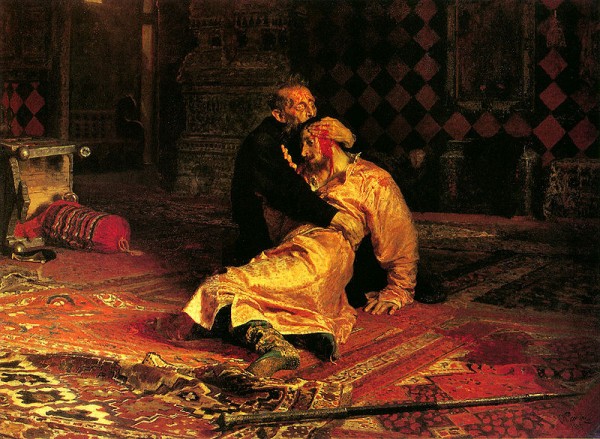 |
This particular Ivan
oversaw Russia's expansion into Siberia. From all accounts,
when Ivan wasn't having one of his frequent unstable spells, he was
a fairly good ruler.
Ivan's biggest mistake
was killing his own son Ivan in a fit of insanity.
In 1581 Ivan beat his
pregnant daughter-in-law for wearing immodest clothing. This
caused a miscarriage.
His son, also named
Ivan, was understandably furious. He engaged in a heated
argument with his father.
Ivan the Terrible lost
his temper and struck the young man in the head with his pointed
staff, killing him. Bad move.
By all accounts, the son
who died was competent. Since Ivan's only other son Feodor was
mentally defective, Ivan's lunacy had just cost Russia any chance of
having a decent ruler to succeed Ivan the Terrible.
Sure enough, Russia fell into a colossal tailspin following Ivan's
death in 1584.
|
| |
The Time of
Troubles
Killing his son was an
especially stupid move because Ivan's other son Feodor was mentally
defective. Ivan's mistake meant Russia was doomed for the next
generation.
The Time of Troubles
came at the end of the 16th century when Russia was leaderless.
Russia's neighbors plundered large pieces of territory during this
rudderless period.
Famine and plague swept
the country. The serfs were miserable, sick and hungry.
Not surprising, there were many uprisings. Many people died in
battles to suppress the serfs. Things got so bad that Russia
lost a third of its population.
This was one of the
darkest period's in Russian history, which is notable in itself
because between the Russian Revolution, the Mongol invasion,
Napoleon's invasion, Hitler's invasion and Stalin's purges, Russia
has a long history of suffering and misery.
Some even suggest there
must be a curse at work.
|
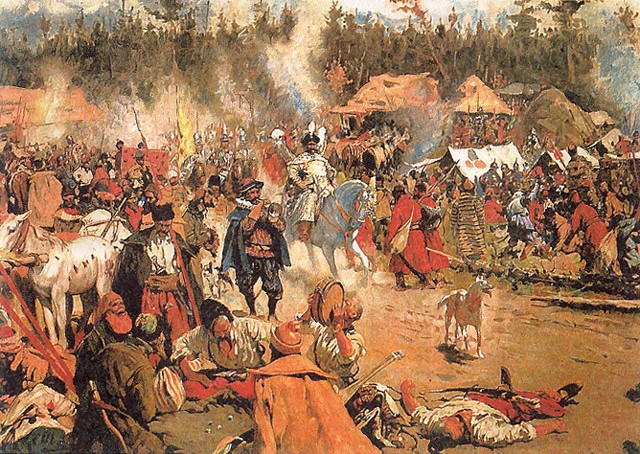 |
|
|
|
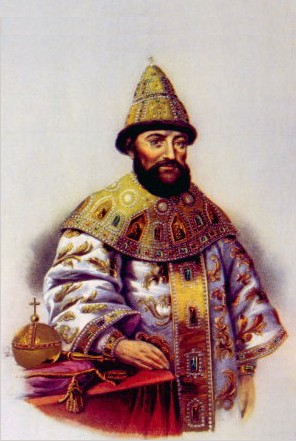 |
The Start of
the Romanov Dynasty
Michael Romanov took the
throne in 1613. His rule was a welcome relief to Russia as he
put an end to the Time of Troubles. The murder of Ivan the
Terrible's son had caused Russia to be ruled by a series of
miserable pretenders to the throne known as the False Dmitris.
Michael's ascension is a
strange story. The boyars were so despondent at the latest fool that
they basically picked the next Emperor the same way the Cardinals
might select a Pope... they conducted a talent search!!
The quest for a new czar began with letters being sent throughout
the land for elected representatives to make suggestions.
Deputies came to Moscow
to select the new czar. It was decided that 16 year old
Michael Romanov was the best choice for czar. His ancestor had been
the wife of another czar, and both his parents had been very
influential until Boris Godunov sent them to the monasteries to
break their power.
There was one problem.
Michael was no where to be found. He was finally found in a
monastery hiding with his mother. Messengers were sent to tell
him of the decision made in Moscow.
Now there was another problem. His mother said absolutely not.
Her son was too young and tender for so difficult an office,
especially in such a troublesome time. Michael wasn't
particularly keen himself. He was definitely aware of the hardships
of being czar of Russia. He told the messengers that he did
not want to become czar.
|
Michael was now subjected to a serious guilt trip. He was
reminded that if he did not become czar, Moscow and the whole
country would fall apart by the struggle for power. The weeping
boyars solemnly declared that if he persisted in his refusal, they
would hold him responsible to God for the destruction of Russia.
Michael's allegiance for his country made him agree and decided to
go to the capital.
On the surface, the
choice of Michael didn't make much sense. At 16, he was hardly
the seasoned man ready to rescue a country from its devastating
problems. Fortunately, he had two things going for him.
First, Michael was very gentle and didn't make enemies.
Second, Michael had an
ace in the hole. Once he ascended to power, Michael recalled
his father Feodor Nikitich Romanov (also known as Patriarch Filaret)
from political exile. For the next twenty years, it was
actually his father who ruled Russia and restored it to stability.
Not that Filaret was
perfect. He was the man who passed the rule obligating the
peasants to become virtual slaves to the land they were born on.
This short-sighted move at the very beginning of the Romanov dynasty
would ironically plant the seed that would lead to their destruction
during the brutal 1917 Russian Revolution. The brutal
cold-blooded execution of Tsar Nicholas, his wife Alexandra, and
five of their six children to this day remains one of the most
chilling images of the Bolshevik takeover.
|
The Reign of
Peter the Great
|
Say what you will about the character of Peter, one of the greatest
thugs in history, but no one can deny he was the most effective
ruler Russia ever had.
Peter the Great was a
grandson of Michael Romanov, the first of the Romanov line.
Michael had been succeeded by his son Alexei I.
Alexei had four
children. Alexei's death in 1676 was followed by 13 years of
dynastic struggles between his three children by his first wife (Feodor
III, Sofia Alexeevna, Ivan V) and his son by his
second wife, the future Peter the Great.
Feodor III was an
effective leader, but very sickly. He died in 1682 after only
six years of reign. Peter and his half brother Ivan V were
then named co-tsar (women weren't allowed to be Tsar).
There were two problems
with this arrangement. Peter was only 9 and Ivan was mentally
incompetent. Into the breach stepped half sister Sophia to
become the de facto leader of Russia.
Peter was just a kid. He
was more than content to let Sofia run the show while he pursued his
own interests. Unfortunately, Sofia enjoyed her time in the
sun a bit too much and didn't want to stop. She began to plot
against her younger half-brother.
In 1689 Peter narrowly
missed being assassinated in a coup attempt conceived by Sofia.
Peter was 16 at this point. He permanently confined Sophia to
a form of imprisonment at a convent. However, Peter still
wasn't interested quite yet in assuming full control of the
government. Peter preferred to let his mother run the show for
the next few years while he continued his education.
|
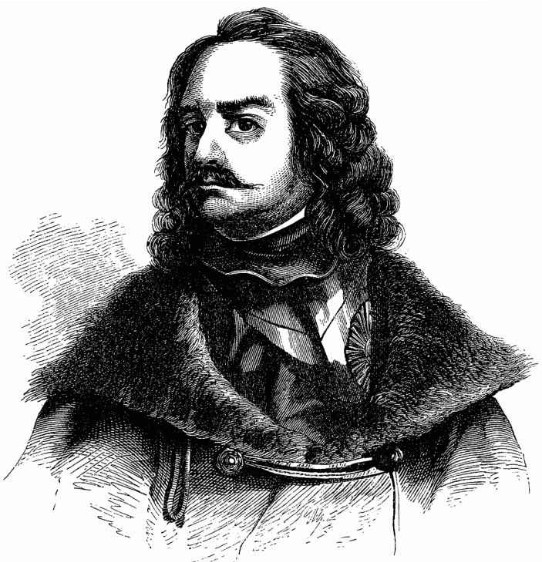 |
So long as he could indulge freely in his favorite pastimes --
shipbuilding, ship-sailing, war drills, sham fights -- he was quite
content that others should rule in his name. Another
explanation was that Peter had just discovered women. Peter
was like the young kid who doesn't want to grow up because he is
having too much fun.
If there was one feature
of Peter's childhood that stands out, it would be his innate
enthusiasm for learning. Without any real prodding, Peter
showed a keen interest in military strategy right from the start.
His childhood enthusiasm for war games would eventually lead him to
become a very effective military leader.
Peter was very
interested in the sea right from the start. He spent summers
at a lake house. A seemingly insignificant event in his life
was the time he found an old sailboat in a shed; this discovery
provided his initial passion for sailing. Peter soon developed
a love for ships and the sea, the overriding hobby of his life.
He became fascinated with ship building and sailing at an early age.
His interest was actually closer to an obsession. During the
years of his training period, Peter deeply lamented the fact that
Russia had no navy. When the time came, he vowed to do
something about it.
Peter also enjoyed
studying mathematics, fortification and artillery. As it
turned out, the young Peter’s interest in military and nautical
games provided a sound training for the challenges ahead.
Like many born leaders,
Peter simply sought out the knowledge. No one forced Peter to
study so hard. He found great pleasure in learning and pursued
it naturally. In many ways, Peter's self-determination to
learn is reminiscent of Alexander the Great. Alexander, of
course, benefitted greatly from years of study under his brilliant
instructor Aristotle.
|
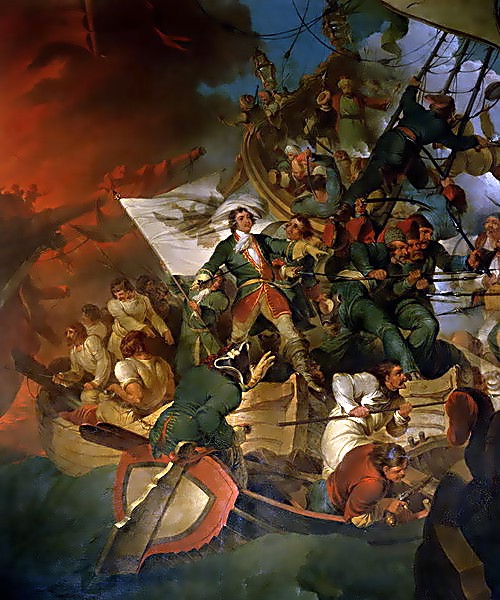 |
Like Alexander, Peter
used both his education and his late start as ruler to meditate on
Russia's position in the grand scheme of things. It is obvious
to anyone who studies Peter's early years that the dominant passion
of his life was his desire to extend his empire and consolidate its
power.
However, unlike
Alexander who was born to wander and conquer everything in his path,
Peter was more like Julius Caesar who did his conquering first, then
spent the rest of his life trying to make Rome great.
Besides his keen
interest in knowledge, Peter had another trait that separated him
from all previous Russian rulers. From the start, Peter was
keenly interested in European politics and European advances in
science.
He took special note of
how England ruled the waves. He concluded that in certain
situations naval power could be just as important as having an army.
Naval power could be used for protection against invasion.
Naval power could be used to promote valuable trade and the exchange
of information between nations. He was determined to get a
navy for Russia.
Shortly after the death
of his mother in 1694, Peter decided it was time to embark on his
career. His first action was to attack the fortress of Azov at
the mouth of the Don River and the Sea of Azov. Control would
provide naval access to the Mediterranean Sea.
That is when Peter built
a crude "first-ever" Russian navy. He began work on simple
ships upstream on the Don River. When the time came, he used
his ships to surprise the defenders at Fort Azov. Peter
managed to take the fortress. However, Peter noted his hold on
the fort was flimsy at best.
Although the campaign
was a success, it was evident to Peter that he had achieved only
partial results since his flock of boats was bottled up in the Sea
of Azov due to Ottoman control of the Strait of Kerch.
|
Peter's Navy
This naval vulnerability
rankled Peter no end. He had learned during this fight that
Russia would never accomplish much if it remained simply a land
power. Peter determined that he would learn everything there
was about building a navy so that someday he could come back and
defend this fort properly with modern warships.
A regular navy was
necessary for resisting the Ottoman attacks. He needed specialists
who could build and navigate military ships. So he returned to
Moscow and ordered his assembly to get to work. On October 20,
1696, the Boyar Duma decreed the creation of the regular Imperial
Russian Navy. This date is considered to be the birthday of the
Russian Navy. The first shipbuilding program consisted of 52
vessels.
Peter's fears of
losing the fortress of Azov led him to another fateful
decision. Peter decided the Ottoman Empire was too strong for Russia
to take on alone.
Peter's aim was to form
a grand alliance against the Ottoman Empire and to acquire
Western techniques
to modernize
Russia's armed forces.
Peter decided it was time to visit Western Europe and see things for
himself.
|
He left trusted people
in charge back home and began his world tour in 1697 accompanied by
a group of one hundred nobles. One
peculiarity was that Peter traveled incognito much of the time.
His ambassadors would meet with heads of state while he pretended to
be an aide in the background. Peter was "different" in ways
that few of us understand.
At one point during his
journey, Peter actually worked for several months in a Holland ship
yard as a ship carpenter's apprentice. He didn't just observe;
Peter did the actual work and loved every minute of it.
Having gained
considerable knowledge of European industrial techniques, Peter
hired many European artisans to return to Russia with him. With
their skill, he could build a navy that might accomplish something
not just in Black Sea, but the Baltic Sea as well.
In 1698 Peter returned
to Russia in an agitated state of mind. The European visit had
made a powerful and lasting impression on Peter.
Peter's journey had
revealed his own country lagged far behind the European states in
education, science, military, and trade.
|
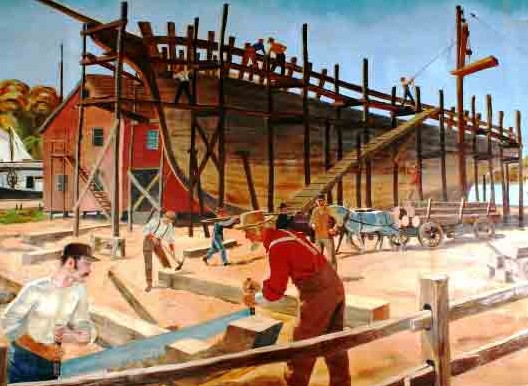 |
Now that Peter had seen how the leading European powers went
about their business, the Russian tsar decided it was time to get
serious. He embarked on an ambitious program to transform Russia
into an advanced European country. Peter immediately began to
modernize the armed forces and launch domestic reforms.
Peter's foreign tour had
convinced him of the inherent superiority of the foreigner in the
world of fashion as well. Upon his return, Peter at once
ordered the men to get rid of their long beards and to stop wearing
the Oriental costumes which symbolized the arch-conservatism of old
Russia. Peter dictated it was time for Russians to start looking
more like the people from Western Europe.
It was a test of
willpower. The Russian people wanted to cling to their
traditions. Peter wanted things done a different way.
Naturally the Russian
people and the boyars resisted mightily and protested behind Peter's
back. Peter would have none of it.
Peter didn't bother with
persuasion. If getting things done his way required breaking the
resistance of the land-owning nobility, then Peter would shove it
down the boyar's throats. He severely punished all opposition
to his projects. Knowing Peter, this meant making lots of offers no
one could refuse. To refuse meant torture or beheading.
The boyars didn't like
it one bit, but they cooperated. Or else...
By coincidence, Peter
embarked on his life project right as the new century began.
1700 is a famous date in Russian history.
1700 is the year that
Peter began to shove Russia kicking and screaming towards its
destiny.
|
|
|